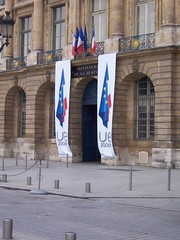
Letter to European commission urges implementation of law that would label oil from tar sands as dirtier than other crudes
Twenty-one Nobel laureates including South African anti-apartheid campaigner Desmond Tutu have written to European Union leaders urging them to implement a law that would label oil from tar sands as dirtier than other crudes.
The EU tar sands proposal has incensed the government of Canada, whose economy is highly dependent on its vast reserves of unconventional oil and it has overshadowed protracted talks on a trade treaty with the EU.
The Nobel laureates say the EU law is necessary because “the extraction of unconventional fuels – such as oil sands and oil shale – is having devastating impact on climate change.”
The letter was sent this week to European commission president, José Manuel Barroso, and EU heads of state.
Apart from Tutu, another peace laureate on the list is Jody Williams, who received the prize for her work to ban landmines. Some others won Nobel prizes for chemistry or medicine.
Williams, who is from Vermont in the US, which could be a route for transporting tar sands, says her opposition is both “very personal and very global.” For her it is a matter of world peace. “Climate protection certainly affects any possibility of creating a world of sustainable peace.”
Canada sits on the world’s third-largest crude reserves after Saudi Arabia and Venezuela. But the vast majority is unconventional, including tar sands – clay-like deposits that require more energy than conventional oil to extract.
Very little of it makes its way to Europe for now, but that could change as new pipelines are being developed such as TransCanada Corp’s Keystone XL pipeline.
EU member states approved legislation in 2009, called the fuel quality directive, with the aim of cutting greenhouse gases from transport fuel sold in Europe by 6% by 2020.
In October 2011, the commission proposed detailed rules for implementing the law, including default values to rank fuels by their greenhouse gas output over their wells-to-wheels life cycle.
So far the commission has said it is standing by its value for tar sands – of 107 grams per megajoule – making it clear to buyers that the fuel source had more greenhouse gas impact than average crude oil at 87.5g.
Intense Canadian lobbying and an inconclusive EU vote on the law forced the commission to announce an assessment of the impact of the fuel quality directive in April 2012.
EU sources say the assessment has been concluded, but not yet made public, so the law is still in limbo.
The Canadians have argued the EU law discriminates against Canadian oil and have taken every opportunity to press their case.
The commission has said repeatedly it would stand firm on the law, but the pressure to weaken the measure is intense.
No one from Barroso’s office was available to comment.
Related articles







